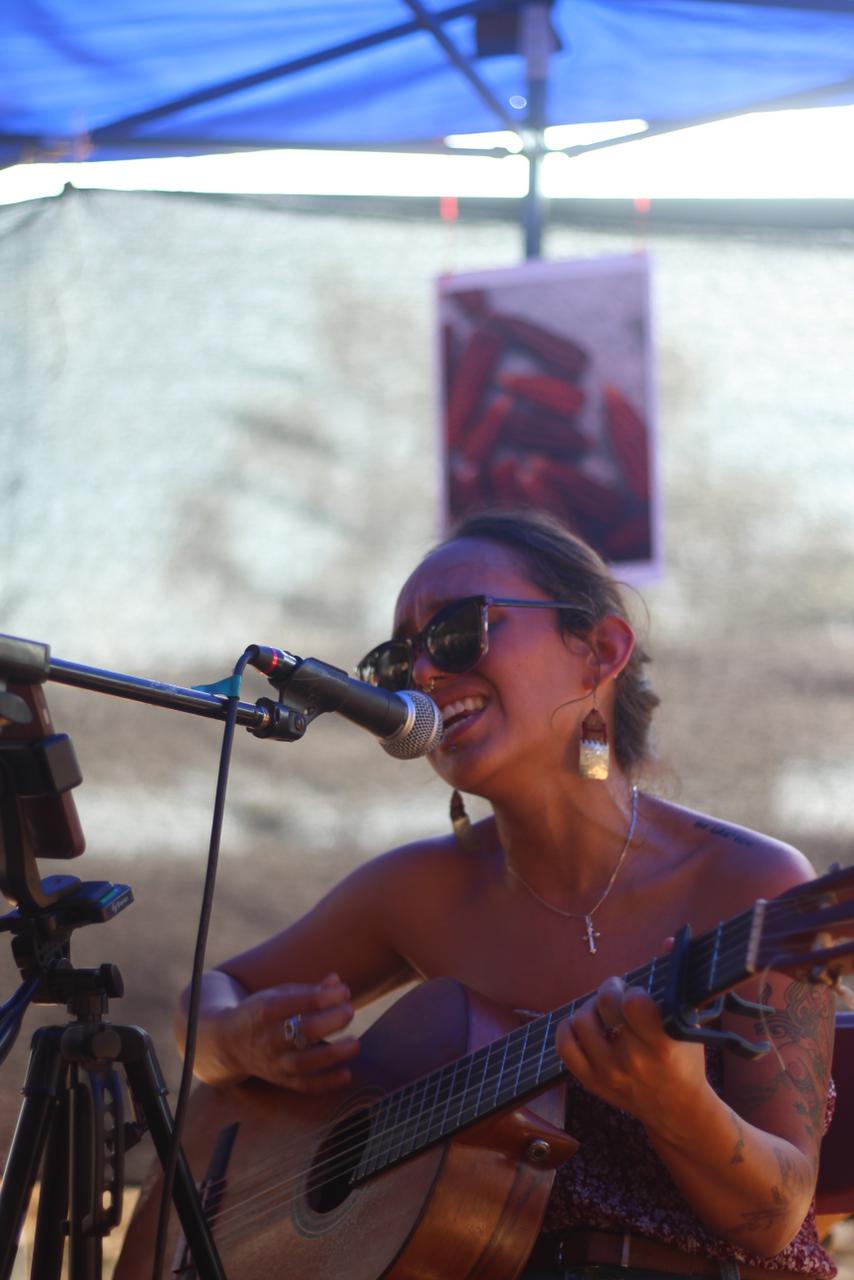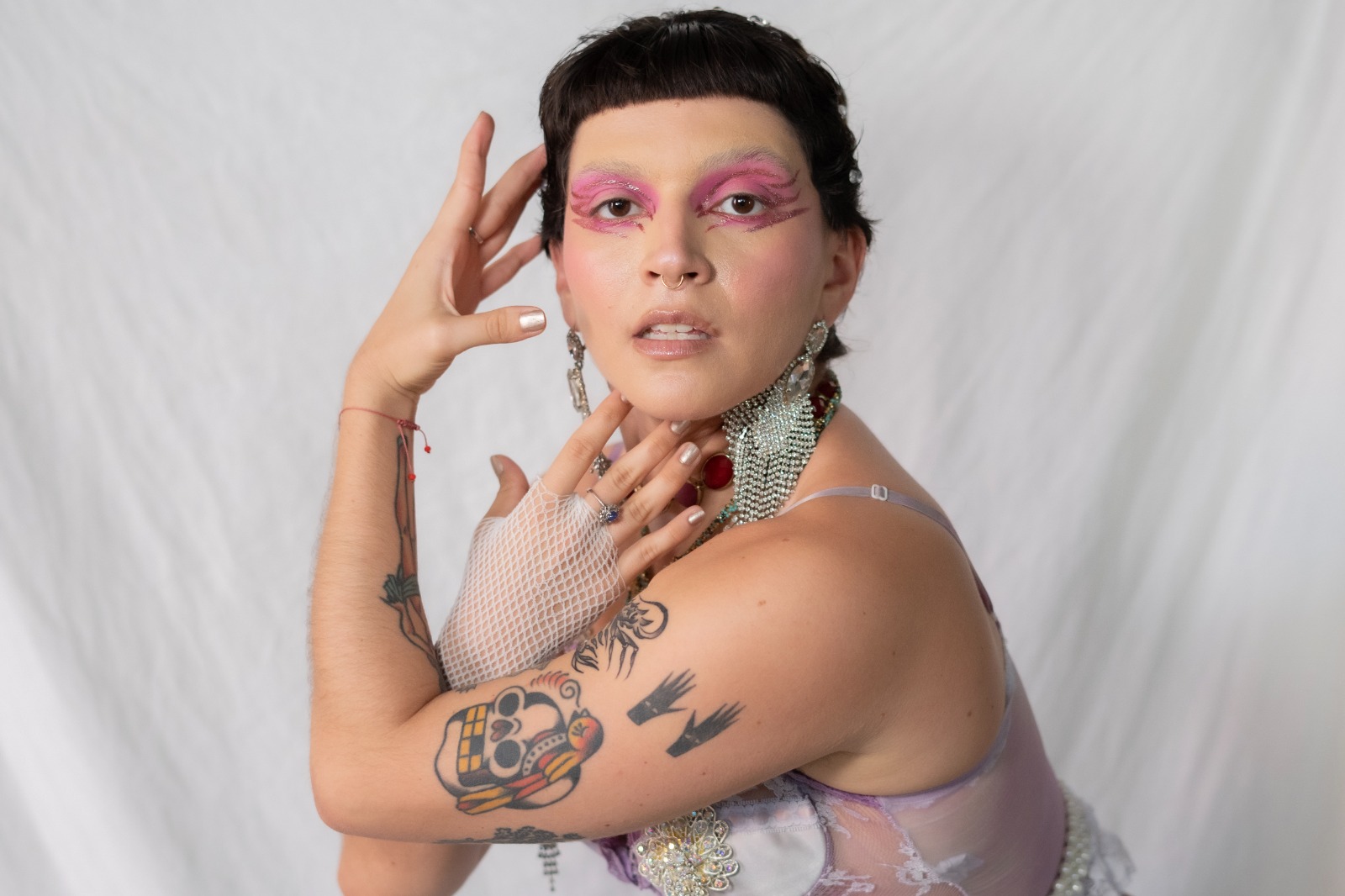By Katia Rejón
➤Playlist to read this text.
Words conjure the world. This is why the spoken word has always been part of rituals– in novenas when someone says a phrase (almost always full of religious guilt) for a choir of the faithful to repeat the rhythm and sound, or in spoken poetry that is something like praying to life. And, of course, in the bare and massive energy of song.
Finding the rhythms that accompany my aches and pains in a Spotify playlist has become my personal ritual. The problem is that almost every song tells the same story: love gone wrong. No, cisheterosexual love gone wrong. But these days women, dissidents and racialized people in Latin America no longer only suffer for the love of a partner. We no longer speak only of nostalgia, but of solastalgia (a word that names the pain of the loss of nature). We are also hurt and moved by issues such as colonialism, labor exploitation, extractivism, racism.
In the search for the word that invokes the life I want, I found protest music. The protest song or social song became popular in the sixties in Latin America. There was even an International Meeting of the Protest Song in 1967 in Cuba, which established the definition of this type of music as “a weapon at the service of the people”, according to researcher Miryam Ibeth Robayo Pedraza, in her article La canción social como expresión de inconformismo social y político en el siglo XX (Social song as an expression of social and political nonconformity in the twentieth century).
Many things have happened since the 20th century and now the protest song is more than Pablo Milanés and Silvio Rodríguez. The political songs of the sixties needed more women. Today many of the protagonists of protest music in Latin America are women.Their voices speak of love, yes, but in ways that don’t feel repetitive. They express love as a blanket that can be extended freely and be directed towards friendships, one’s own body, to life, to animals. The protest music composed and performed by cis and trans women and non-binary people introduce the conversations that we need to be having collectively.
It occurs to me, my darling, that you are in time/ to understand that the song is the remedy for those who live without breath, says singer-songwriter Silvana Estrada from Veracruz.
What is the experience of the people who create these reflections? I interviewed three Mexican singer-songwriters from Yucatan to understand how language in music “Is a weapon/breaking the mold”, as Audry Funk says.
Daniela Romero was singing with her eyes closed in a small forum in Mérida, Yucatán when I first heard her and La Muchacha, a Colombian composer who writes music about territory.
Daniela sang a cover of La Muchacha’s No Azara: Y a mí que no me coja la muerte/ ni siquiera en la puerta ‘e mi casa/ porque en esta tierra que es tan mía/ no tengo que chuparme las balas. (Death will not catch me/not even on the doorstep of my house/because in this land that is so mine/I do not have to swallow the bullets.)
It was like putting subtitles to a pain that I didn’t quite understand and realizing that it was not only mine,–it was shared.
Romero, with her partner Dominique Osses, make up the protest music duo Okupa Latina. In our interview, Daniela talks about how living in colonized territory reminds her that “the conquest” that happened 500 years ago in Mexico is still going on. She was born in Campeche, but for the past few years she has been living in Yucatán, both states in Mexico’s southern peninsula:
“It seems to me more than necessary to look at music always through the filter of colonization, especially on this continent. We are in the era of capitalist religion and many of us learn or have to learn about music in this context”.

She notes that it’s hard to differentiate the music industry from the love industry, because in the songs the traditional relationship model is overexploited (like everything in capitalism). But she believes that Latin American women’s movements have opened the door to the representation of other love stories.
“It’s urgent for me to have more political and emotional representation. This year I have reproduced many songs about relational anarchy and my own processes to open my relationship. It has been nice to find references in other places like Silvana Estrada and Renee Goust, to find those voices to create my own”.
She began to create her voice when she was 6 years old and composed a song for her mother. It became clearer when she migrated from Campeche to Yucatán and went from the calm of one place to the insecurity of the other. From that change of landscape and her first “fundamental wound” as she names it, her first protest song was born.
“If I could turn it into a metaphor, for me, making protest music is like baths of understanding that come to me from one moment to the next. It’s very erratic, the rhythm lies in how things happen to me, how I feel them. I make protest music because I’m challenged by contact with the world and I don’t understand how people go to sleep peacefully knowing that horrible things are happening. Making songs is the way I’ve found to survive. Music soothes me and is more of a necessity than a profession. I’m not in the business of making songs–I have to make them.”
Nina Nina is hard to place in a single beat. She moves between hip-hop, vogue, rap, reggaeton, electronic music. She’s one of the queens of the underground tracks in the city of Mérida–a DJ, producer, performer and one of the Hijas del Rap (Daughters of Rap), a hip-hop collective that also sings about those other forms of love. My favorite? Másturbo: Yo sí me autocuido! MásTURBO hago ritual para conectarme/ satisfacerme y darme gusto, me amo me gusto/estoy toy toy conmigo/ tocando las piezas que me gustan.
I take care of myself! MásTURBO I do rituals to connect/ satisfy myself and indulge myself, I love myself, I like myself/ I’m with me, toying with me/ touching-playing the pieces I like.
“We still need to do a lot of imaginative work, to think of new ways of loving that we are building from other places. The narrative of traditional romantic love doesn’t work for us, it’s too small for us, it doesn’t adapt to our reality. In southern Mexico, when we talk about love we also talk about love for the land or for friends, for resistance and collectivities. New languages push our imagination towards new narratives and other possible loves. Great changes happen from words”.
Nina is from Veracruz and the son jarocho décimas (traditional verses) were her first approach to the spoken word as a way of narrating the world. But she says that meeting the Hijas del Rap -particularly Phana Mulixa, whom she describes as her teacher and mentor- was a turning point. It was a moment of recognizing that rage had to be organized and transformed to enunciate the world in which she wants to live.
“I see very diverse narratives in Abya Yala. It is not the same reality in Mexico as in Argentina, Costa Rica, El Salvador. What’s interesting is the interest in listening to the projects of other compañeras. There is more and more awareness of what we consume and the messages that capitalism wants to force on us. And I don’t think we can demand that people listen to our music because people are used to living with worn outrhythms. Finding new music is an effort that not everyone can make,” she says.
Protest music doesn’t stop at words. It also protests to resist a way of composing, distributing, collaborating and producing music. Kill Beat is a rapper who introduces herself in verse: Me cuida la espalda mi abuela y sus bendiciones/ Mi carta de presentación son mis acciones/ Dame el micro que te lo devuelvo en llamas/ La morena con más flyback.
My grandmother with her blessings has got my back/ My actions are my introduction/ Give me the mike I’ll give it back to you in flames/ The dark-skinned one with the most flyback.

She sings the words directly to the camera in one of her Instagram videos. It’s night, but she’s wearing sunglasses that go great with her embroidered huipil (traditional clothing) of the Mayan people. With one hand she gestures to emphasize the pulse of her words and with the other, she holds a large styrofoam cup that we all know has cheva (beer) in it.
“My grandparents were henequen slaves. I came from a very stigmatized place, of thick silence, of not being able to be yourself. In the rap underground I found voices like Arianna Puello, a Dominican rapper. Her album El gancho perfecto (The Perfect Hook) is one of the ones that moved me the most because she was a pioneer in talking about those topics and with that style, that flow that caught you,” says Kill Beat in an interview.
In the rap underground you find voices that go beyond the ego trip or romantic rap, which, according to Kill, are the narratives heard the most. To talk about different things you also have to be on the fringes of what the mainstream industry is asking for in music. You have to look for the stories and insights that are out there.
“Now, with streaming platforms we can find music from any place in the world. I sometimes feel like we don’t even look for the voice anymore, but rather a rhythm that desaturates us from the messages coming at us from all over.”
When Kill started composing, she did it by downloading tracks from YouTube, circumventing economic and physical limitations with the possibilities of technology, until she managed to collaborate with a studio. Someone liked what she was narrating, her music. It had content and Kill learned that the trite story of the artist who creates herself without anyone’s help is also a stereotype.
“I was recently told something: that you have to think about whether what you do is for a moment or for a lifetime. Believing that music is going to be for my whole life makes me think about art in another way, without rushing and without the aesthetic pressure.”
Daniela Romero describes the music industry as a romantic and violent monster. She echoes Kill Beat when she says that the spaces and physical tools to create music are centralized in places where the infrastructure and the music scene tightly interwoven with capitalism, and limited to people living on the margins of big cities for whom “making a living from art” is a dream. The precariousness and violence experienced by most people causes a creative crisis.
“It’s hard for me to think about music only from the perspective of whether I will like it or not. And to create it, I can only do it with people who it takes time to build a bond with. I’m demimusical. Yes, music feeds me, but it also generates this degree of correspondence with the love I feel in the world, which makes me feel alive and want to be alive,” says Daniela Romero.
Right now she is finishing composing a song that started during the pandemic. It’s called Voy a nadar (I’m Going Swimming) and is the conclusion of a series of messages that has taken her a long time and that she began to put outjust a few days ago:
“People also have to understand that producing music outside the mainstream implies other rhythms, other times. It will take us longer to release an album, but it will come out, and when it comes out it will be something that shows some very hard work”.

The songwriters interviewed have in common that they don’t make songs to be hits on the radio, that there are things that pay without filling stuffing your wallet. They write, for example, about the cumbia that heals: Un ramazo de cilantro y huevo/ Pa’ dejarte como nuevo, abuelita/ Si tú trae peyote y marihuanol /Yo me sano con el mar, con el sol.
A sprig of cilantro and an egg/to leave you like new, granny/You can bring peyote and marijuana/I will heal myself with the sea, with the sun
About this song by the Hijas del Rap, Nina Nina explains: “My grandmother gave me my first limpia (cleansing) when I was 15 years old, she said I was entering another phase of life. The sprigs, ramazos, passing the egg over, marijuana and peyote have been ways to heal individually and collectively. They have always been there and the music reflects the work of registering that oral tradition, that spirituality and healing”.
Nina has openly decided not to enter into forms and forums that do not adapt to her reality or where she doesn’t feel represented. Trying to belong to foreign places implies modifying many things, sometimes, essential things.
“Quitting the mainstream doesn’t mean renouncing a life with dignity, on the contrary. I think we are deciding to live with dignity as artists when we decide to follow our own punk rhythms of creativity. For me, it is a pleasure to move in the underground. I like to say that the projects I participate in are cult projects. Our message doesn’t have to be for everyone, but we want it to reach those who need to hear it, because we were also the people who heard a message and it moved us”.
Besides belonging to a movement of Latin protest singer-songwriters, Daniela Romero, Nina Nina and Kill Beat have something else in common: they all share their music with girls, in educational and recreational settings. Those collaborations have taught them things they couldn’t learn anywhere else. “The discourses of women in music are deeper and we are also weaving more profound networks, not only among ourselves, but also with communities such as LGBT people, with people who have felt isolated. And I don’t know if you’ve noticed, but there are even little girls out there rapping.”
She mentions the name Angi Nicole, an 8-year-old girl from Yucatán with six rap singles on Spotify. A few months ago, Kill Beat taught some workshops for girls at the Casa de la Mujer Indígena de Yucatán (CAMI) and saw how the girls enjoyed a level of autonomy that many of us would have wanted to have in childhood:
“The lyrics I’ve put out with the girls are always about wanting to be free, to fly, to not want to be harassed or quiet. You give them a microphone and they tell you everything they don’t want because they are very clear about it.”
A generation of girls is coming up that will be able to listen to lyrics with a more critical perspective. As Nina Nina says: the mainstream is so unoriginal that it has to feed from the margins. So somehow this underground music is going to end up impacting broader narratives ,and the girls of tomorrow will know that there are many ways to express and understand life.
“In the Daughters of Rap workshops we saw that they use language to describe their own universe without using these words like ‘struggle’ or ‘resistance’, which are also a military lexicon. Girls living in a Mayan village use a bilingual and more familiar language. It’s super interesting to see how this makes their reality even more complex,” says Nina Nina.
The pedagogical importance of music has been widely studied and Daniela Romero stresses that being on stage is not enough. The stage is not the only place where music can be presented and when she shares music in spaces with children she realizes how it breaks barriers in emotions and understandings.
“Things happen in a classroom that couldn’t happen outside, and they are things that we need to happen. We’re allowing ourselves to have more real encounters with girls and new, really dignified ways of inhabiting emotional space with other bodies. We can no longer look at girls outside of art as a political subject. They are with us, creating their own worlds. And if we can look at it from a dignified and loving place and with a lot of awareness, I think we’re going to do well.”
Katia Rejón Márquez (Campeche, 1993) Journalist and writer. Co-founded the magazine Memorias de Nómada and the podcast Fugitivas mx. She writes about environment, anti-racism, gender and culture.



